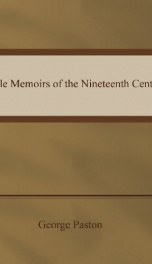Little Memoirs of the Nineteenth Century

If it be true that the most important ingredient in the composition ofthe self-biographer is a spirit of childlike vanity, with a blend ofunconscious egoism, few men have ever been better equipped than Haydonfor the production of a successful autobiography. In naïve simplicityof temperament he has only been surpassed by Pepys, in fulnessof self-revelation by Rousseau, and his _Memoirs_ are notunworthy of a place in the same category as the _Diary_ and the_Confessions_. From the larger public, the work has hardlyattracted the attention it deserves; it is too long, too minute, tooheavily weighted with technical details and statements of financialembarrassments, to be widely or permanently popular. But as a humandocument, and as the portrait of a temperament, its value can hardlybe overestimated; while as a tragedy it is none the less tragicbecause it contains elements of the grotesque. Haydon set out with thelaudable intention of writing the exact truth about himself and hiscareer, holding that every man who has suffered for a principle, andwho has been unjustly persecuted and oppressed, should write his ownhistory, and set his own case before his countrymen. It is a fortunateaccident for his readers that he should have been gifted with thefaculty of picturesque expression and an exceptionally keen power ofobservation. If not a scholar, he was a man of wide reading, of deepthough desultory thinking, and a good critic where the work of otherswas concerned. He seems to have desired to conceal nothing, nor to setdown aught in malice; if he fell into mistakes and misrepresentations,these were the result of unconscious prejudice, and the exaggerativetendency of a brain that, if not actually warped, trembled on theborder-line of sanity. He hoped that his mistakes would be a warningto others, his successes a stimulus, and that the faithful record ofhis struggles and aspirations would clear his memory from theaspersions that his enemies had cast upon it.Haydon was born at Plymouth on January 26, 1786. He was the linealdescendant of an ancient Devonshire family, the Haydons of Cadbay, whohad been ruined by a Chancery suit a couple of generations earlier,and had consequently taken a step downwards in the social scale. Hisgrandfather, who married Mary Baskerville, a descendant of the famousprinter, set up as a bookseller in Plymouth, and, dying in 1773,bequeathed his business to his son Benjamin, the father of our hero.This Benjamin, who married the daughter of a Devonshire clergymannamed Cobley, was a man of the old-fashioned, John Bull type, wholoved his Church and king, believed that England was the only greatcountry in the world, swore that Napoleon won all his battles bybribery, and would have knocked down any man who dared to disagreewith him. The childhood of the future historical painter was apicturesque and stirring period, filled with the echoes of revolutionand the rumours of wars. The Sound was crowded with fighting shipspreparing for sea, or returning battered and blackened, with woundedsoldiers on board and captured vessels in tow. Plymouth itself wasfull of French prisoners, who made little models of guillotines out oftheir meat-bones, and sold them to the children for the thenfashionable amusement of 'cutting off Louis XVI.'s head.'
Info about the book
Author:
Series:
Unknown
ASIN:
B002BAEH60
Rating:
4/5 (2)Your rating:
0/5
Languge:
English
Users who have this book
Users who want this book
What readers are saying
What do you think? Write your own comment on this book!
write a commentGenre
if you like Little Memoirs of the Nineteenth Century try:
Do you want to exchange books? It’s EASY!
Get registered and find other users who want to give their favourite books to good hands!








